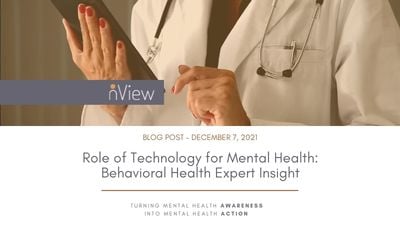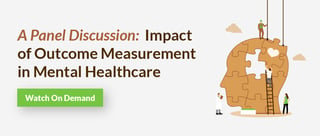
A few months back, nView hosted "The Second Pandemic of Mental Health: An Expert Panel Discussion." This webinar, available as an on-demand recording, brought together behavioral health experts for a discussion about the current challenges and opportunities around mental health. The panelists were Dr. Hansa Bhargava, Dr. Josh Spitalnick, and Sherry Farrugia.
The program was hosted by nView Health and moderated by Dr. Tom Young, a board-certified family physician, and chief medical officer, and founder of nView.
Below is an excerpt from the webinar that provides the panelists' responses to questions asked by Dr. Young concerning the role and value of technology in improving mental health services and our healthcare system. It has been edited for length and clarity.
Note: nView's next expert panel discussion webinar on the "Impact of Outcome Measurement in Mental Healthcare" is scheduled for December 8 at 4:00 PM ET. To learn more and register, click here.
Q: What role can and should technology play in supporting and accelerating progress toward fixing our flawed mental health system?
Josh Spitalnick (JS): Everything a physician does is based on science, data, metrics, preconceived medical directories, and FDA regulations, and I love that. But for psychology, counseling therapy, family therapy, and social work — this world is just not developed that way. Sometimes it can take 10 or even more years for a therapist — and I use that word "therapist" as an umbrella category — to get an accurate diagnosis. This is disturbing.
But that can change if you have reliable metrics, which most primary care doctors and medical care providers already rely upon, such as data supporting a diagnosis of heart disease and cancer markers. There is enough data out there concerning depression and all the anxiety categories for what we would classify as a specific depressive episode. That's someone who's actively suicidal. Someone who's battling substance abuse versus dependence. There are clear instruments available that the field knows about and have been proven and demonstrated to be effective ways to assess and diagnose problem areas.
The problem here is that I'd be shocked if even one-fifth of my field uses those instruments, specifically those relying upon paper and pencil. Move those to digital and I think you'd see a significant uptick in usage. I would love to see therapists, clinicians, psychology-level licensed professional counselors, licensed clinical social workers, and other like professionals essentially being required to offer evidence-based assessment at the beginning of a patient encounter, that might then lead to evidence-based diagnosis in the middle, that might then lead to evidence-based interventions.
Most therapy services, if done properly, don't take 3-5 years. They can be done in 3-6 months. For some problem areas, it can be just 3-6 sessions. But when you're not assessing and diagnosing properly, you're starting blind. There's enough low-budget technology out there, from electronic medical record systems, mobile apps, and digital platforms for surveys, to bring together all the most proven assessment tools that lead to accurate diagnoses. Then we just need to clinicians get trained on doing the "gold standard" of whatever the intervention is for that problem area.
That's just the beginning of it all. We cannot imagine a medical assessment of someone that doesn't rely upon real data and science determining what a diagnosis is, yet our field is still playing Russian roulette with this.
Q: What are some key considerations for providers as they research their technology options?
Hansa Bhargava (HB): The American Academy of Pediatrics recently released a policy asking all pediatricians, no matter what the complaint is, to do a screener for mental health. I think that's really important. But here's the part that wasn't spoken about that I think must also be addressed: physicians are overburdened. They're burnt out. They need to have a quick and efficient way — and one that is evidence-based — to be able to diagnose a mental health condition and put a patient on a treatment plan.
Mental health should be treated as a fifth vital sign because we know the links between physical health and mental health. If a stroke patient is not mentally well, chances are they're not going to be as compliant with their treatment regimen. We also know that biologically, stress can have an impact on a patient's wellbeing and create havoc all over the body.
I think we need to have screeners that are efficient and digitally based. I also think we need to keep in mind that performing a screening cannot be one extra task for already burdened primary care physicians to complete.
Sherry Farrugia (SF): The screening must be integrated into the workflow for the primary care provider. We cannot risk further overloading them. The only way that's going to happen is through using technology.
JS: With technology, we can have a quick screener that scientists have approved for depression, anxiety, or any other problem area. The next level is using that technology to make what is essentially a repository of potential referral options. But if you put all the burden on primary care, it's not going to be sustainable. The front lines of mental health start in the medical office and sometimes in the emergency room, but when that gets referred or triaged out, primary care is not in the position to deal with what happens next.
That's why there must be an interaction between primary care and the behavioral health division. I think integrated models are some of the best options, but they're likely difficult to sustain from a business and policy standpoint. I have a few colleagues who are mental health professionals who work in primary care settings. They love their job. There's a real interaction between medical professionals doing screenings and that legwork that must be done. Then if it needs to go to a higher level of care, the mental health provider knows how to refer this out.
That's a beautiful interaction between personnel and the use of technology around making decisions, but it still starts with evidence-based measurement — figuring out what's wrong and who do we go to for help. That's from assessment to triage to treatment planning. This can be accomplished with light technologies. We're not talking about sophisticated, artificially intelligent solutions. These are solutions on tablets; these are surveys; these are things that we've all used, but they're just not being used on a national level.
SF: We're already doing these kinds of things in traditional healthcare. We have transition of care; we have continuum of care; we have primary care physicians making a referral over to the surgeon. Primary care isn't doing the surgery. These models have been proven successful, so if we could take those models and apply them to mental health, hopefully, we would see a more integrated system.
Q: If you were building a technology to fit in primary care, what would you include in it?
JS: That system essentially already exists and is in use at the United States Department of Veterans Affairs (VA). I'm not saying it's the best healthcare system, and I think we've all heard lots of complaints against the VA. But the VA, which is the largest healthcare system in the world the way it's structured, has that integrated model I mentioned earlier, built within the government structure. For primary care to refer to other elective and mental health services, they have a system in place where you get a medical screen and then you're triaged to whatever level of surgery or mental health you require.
What's going to scare people about the role technology plays is the reliance upon a master repository — a list of referral options that people must keep up with. Once you've adequately screened a patient and come up with referral options, if I was a medical provider, I would be worried about whether that referral list is up to date and regulated.
HB: There are some hurdles to think about. But I do think because there is a system that exists, it could be something that we could look at for evidence-based protocols that can be used by hospitals. These could help standardize care in the mental health arena. We don't have to reinvent the wheel. We can look at those models and can use them as building blocks.
SF: Imperative to success is that this must be treated as a priority. It can't be, "I'm not going to deal with mental health in my primary care setting because there's no reimbursement. I'm not going to deal with mental health because it's a distraction." It must be a priority, and there must be a mandate around it.
From a pediatrics perspective, we need a mandate that all our kids will be taken care of. They are the future. They're going to grow up; they're going to be adults, and the issues they're facing aren't going away. But right now, you can go to a healthcare provider and often hear excuses for why mental health isn't treated as a priority: "no reimbursement;" "don't have the personnel;" "can't hire the people because there's no reimbursement." I think that we must look at taking a more holistic approach to how we go after this problem.
Meet the contributors ...
Josh Spitalnick, Ph.D, ABPP - Anxiety Specialists of Atlanta

Dr. Josh Spitalnick is Clinical Director and Owner of Anxiety Specialists of Atlanta. He is a Board Certified (ABPP) Licensed Clinical Psychologist and specializes in providing Cognitive-Behavioral Therapy (CBT) to treat adolescents, adults, and families who are struggling with many of the common issues people face, including anxiety, depression, stress, health, and medical issues, and relationship difficulties. As a CBT psychologist, Dr. Spitalnick is uniquely trained to provide Exposure-based Therapies, which are recognized as some of the most evidence-based approaches for treating anxiety disorders, including Social Anxiety, Obsessive-Compulsive Disorder, Phobias, Panic, and Posttraumatic Stress Disorder.
Hansa Bhargava, MD - Medscape, CMO / WebMD, Sr Medical Dir
 Hansa Bhargava, MD, is a staff physician at Children’s Healthcare of Atlanta, senior medical director with WebMD, and chief medical officer at Medscape Education. As a thought leader in innovation, mental health, maternity, and pediatrics, Dr. Bhargava often speaks on using current digital footprints to elevate data and education to help disparities, opioid addiction, and mental health. She is currently on the board for the Emory University Global Health Institute and Christopher Wolfe Foundation and is an executive member of the committee on communications and media for the American Academy of Pediatrics.
Hansa Bhargava, MD, is a staff physician at Children’s Healthcare of Atlanta, senior medical director with WebMD, and chief medical officer at Medscape Education. As a thought leader in innovation, mental health, maternity, and pediatrics, Dr. Bhargava often speaks on using current digital footprints to elevate data and education to help disparities, opioid addiction, and mental health. She is currently on the board for the Emory University Global Health Institute and Christopher Wolfe Foundation and is an executive member of the committee on communications and media for the American Academy of Pediatrics.
Sherry Farrugia - Global Center for Medical Innovation, Chief Executive Officer

As the CEO of Global Center for Medical Innovation (GCMI), Ms. Farrugia leads all strategic initiatives associated with GCMI’s mission in advancing medtech innovation. Prior to her role as the Interim CEO, Ms. Farrugia was the Chief Operations and Strategy Officer for Children’s Healthcare of Atlanta’s Pediatric Technology Center (PTC) at Georgia Tech. She has also successfully impacted healthcare in her role as the Managing Director of Health IT at Georgia Tech. Before joining Georgia Tech, Sherry owned a successful consulting company where she worked with healthcare companies advising them on new market opportunities, launching new verticals, and worked with startups advising them on market strategy and business plans. She also co-founded and sold a health IT company to McKesson HBO & Company in the early ’90s whose technology was focused on point-of-care documentation and tracking both clinical and financial outcomes – technology McKesson is still using in their systems today. Ms. Farrugia is currently an advisory board member of Pediatric Technology Center, Atlanta Ronald McDonald House Charities; board member of MUSC Foundation for Research Development, International Society of Pediatric Innovation, Southeast Life Sciences, and MedTech Women@SEMDA; active member of the Metro Atlanta Chamber of Commerce.
ce.





.png)







